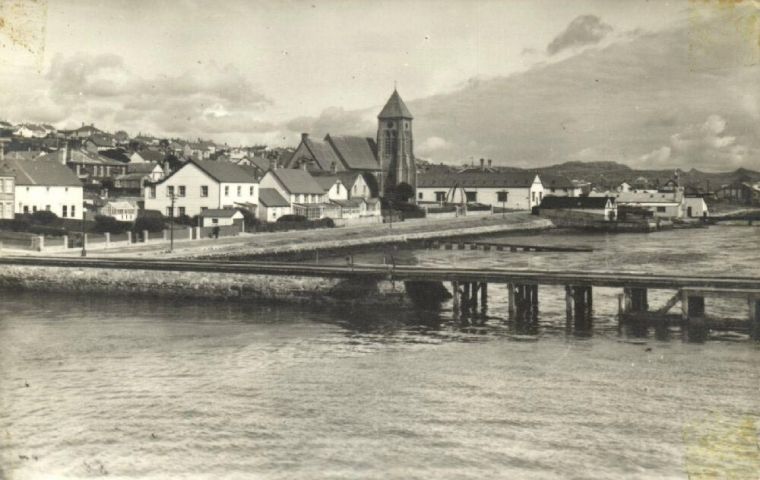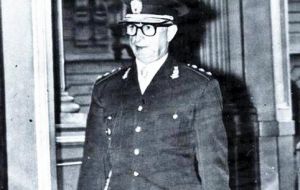MercoPress. South Atlantic News Agency
The Argentine Navy September 1941 “sudden strike” plan to invade and occupy the Falklands
 Stanley, Falklands' capital in the forties and early fifties
Stanley, Falklands' capital in the forties and early fifties  Colonel Benjamin Rattenbach said the problem was not taking the Falklands but defending them from a recapture attempt
Colonel Benjamin Rattenbach said the problem was not taking the Falklands but defending them from a recapture attempt It was 26 September 1941 when an Argentine navy captain presented to the Naval War School a plan to invade, capture and retain the Falkland Islands. Circumstances were different to those nowadays or in 1982, world war and events made Argentina fear the transfer of the Islands to some other country, be it of South or North America and thus she must prepare secretly before they change owner, creating a favorable situation for its interests.
Thus reads one of the 35-page report, and attachment maps, signed by Captain Ernesto Villanueva presented to be debated at the Naval War School, since it was considered a mainly naval theatre, but it also anticipated close Navy and Army cooperation, under an only command and with an only objective. The mission was to return to Argentina the archipelago which it claims and holds a strategic situation of vital importance for the maritime defense of the nation and a territory which is an index of wealth taken from the national heritage.
The 1941 document was presumably “unearthed” and published in the Buenos Aires media by Juan Bautista “Tata” Yofre, who was head of Intelligence under ex president Carlos Menem and has been writing about documents of historic significance for Argentina.
Basically the paper admits that taking the Islands should not be that difficult, from a naval point of view, the problem would be to keep and defend them from organized forces that might attempt to recapture them and that this is where the Army has a role to play
Several pages are dedicated to a survey of the climate, the soil, flora and fauna, the population and the topography of the Islands where military actions could take place. Several landing sites were analyzed and anchorages close to Port Stanley, Johnson Harbor, Port Louis and Stag, from where hydroplanes could also operate. Berkeley Sound is also an excellent place to have the fleet, “once it has been cleared of mines”.
The document then concentrates in Port Stanley and its main offices, administration, Customs, Admiralty Arsenal, supplies, Governor's residence. “With the pictures taken for the report, at this time the cruiser HMS Ajax, which participated in the 1939 River Plate combat against the German battleship Admiral Graf Spee was anchored at Stanley Harbor”.
“We have established that the main wealth of the Islands is its flock of sheep, which ensures meat for the landing troops, plus an infinity of crystalline water sources in hills and elevations, which will provide drinking water. Obviously no mention to fisheries or the oil industry, but yes to the harsh climate conditions, which demands good equipment, as well as a good provision of quality food for the troops to keep them warm.
As to British defense forces the only possible existence is to organize in the Islands a group of 200 volunteers, well equipped with modern weapons but scarce military training. Maybe another 100 men from a visiting Royal Navy vessel, but overall the local defense force could at the most count with 500 men.
Taking into account this possible force the Argentine fleet could easily transport, a battalion of marines fully armed. The thousand men could be distributed among the cruisers, battleships, torpedo boats, a reefer and tracking vessels. The battalion will be supplied with machine guns, mortars, artillery, and communications equipment. The Army can provide an extra 750 men in two transport vessels, which would add to a force of 1.750, and if the fleet is not engaged an extra 500 could land for a total of 2.250.
But as in 1982 the crucial tactic must be surprise. If word gets out and Stanley is the objective, all defense efforts will be concentrated in the capital to resist the invasion or take to the hills for a guerrilla warfare.
Once the operation has been detected, local authorities will try and contact through radio telegraph with the British or US navies asking for help. That is why one of the first actions with naval planes is to destroy Stanley's RT station, with a similar operation at Fox Bay where the other RT is located. However the news could be transmitted by cable to Montevideo, unless the cable is cut, but we do not know its exit position. However a sabotage operation could be managed at the other end in Montevideo. But this could mean involving not only the British but also the Americans and the Uruguayans, points out the paper.
Once planners have decided the landing place, most probably to the south of Berkeley Sound and ensured the beach, the rest of the troops will land early dawn for surprise purposes.
The paper points out that landing is essentially a naval operation and thus the head of the fleet and his joint staff will lead it, but once on land and heading for Port Stanley the command and responsibility goes to the highest Army ranking officer.
Finally the document includes a critical assessment of the planning by Lieutenant Colonel Benjamin Rattenbach, the same officer but as Lieutenant General who analyzed and judged those responsible for the Falklands War in 1982.
Rattenbach writes that ”until yesterday the Falklands represented a rather long distance objective for Argentine strategic possibilities. But current circumstances and reality obliges us to look at them“. The Army officer praises the captain's report as a valuable source of information and in what is described as a ”sudden strike“, the motive of the paper, ”I believe it does not offer major difficulties, not even in the case the local garrison in the Islands has been reinforced by some landing forces from the South Atlantic Squadron. The difficult part will be later, keeping the Islands if and when the British attempt to recover them”.




Top Comments
Disclaimer & comment rules-

-

-

Read all commentsThis article, whilst factually correct, plays down the “why” of the whole point of Villanueva's report. Argentina, in fact Peron, was banking on Germany and fascism, for which there was a lot of support, winning the war. Peron had already tried to bring the public's focus to bear on taking the Falklands by writing it into the constitution. Interestingly in 1945 he changed his mind about whom to back.
Sep 10th, 2019 - 11:23 am +9Soldiers playing? I am sure over the decades there were many such war games.
Sep 10th, 2019 - 11:07 am +8They could have held them till 1945.
Sep 10th, 2019 - 08:17 pm +7When the Royal Navy would have turned up in no tender mood and Argentina would have a lot of explaining to do :)
Commenting for this story is now closed.
If you have a Facebook account, become a fan and comment on our Facebook Page!